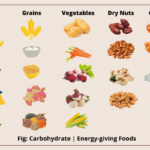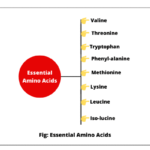Minerals in Food | Types, Functions, Sources
We know vitamins are important for staying healthy, but minerals are also equally important for good health. So, let’s understand in detail what are minerals in food.
What are Minerals?
Minerals are inorganic nutrients that are present in the body tissues, fluids, bones, teeth, and hormonal secretions.
Our body cells, tissues, organs, and certain fluids in the body need minerals for their proper functions. In an adult, 4 percent of body weight is composed of minerals. The foods we eat have minerals in them. We need in very small amounts to survive. They are found in all sizes.
Minerals are also called elements that mean they cannot be broken down into simpler substances. Vitamins are found in living organisms, minerals are found in non-living matters. That’s why, minerals are known as inorganic or nonliving.
Minerals elements play an important role in maintaining good health because they are part of our body cells, tissues, skeletal structure, and certain fluids. Vitamins, enzymes, and hormones contain minerals.
Table of Contents
Mineral elements are required in minimal amounts in our body, but they have very important functions in the body. Therefore, it is necessary to fulfill their requirements. Their synthesis is not produced in the body.
Therefore, it is necessary to take them into the diet. Minerals are found with organic and inorganic mixtures or as independent ions in our body. According to the study, a total of 24 mineral elements are found in the body in which some of them are important for our body.
Types/Classification of Minerals in Food List
Minerals are divided into two groups according to the level of daily requirements. They are called macrominerals and microminerals. Microminerals are also known as trace minerals.

Both macrominerals and microminerals are important and essential for good health. Most of the necessary macrominerals are found in group 1 and group 2 of the periodic table of chemical elements.
These macrominerals have relatively low atomic numbers and are generally quite rich on the earth’s surface.
Macrominerals
The word macro means “large” or “major”. Macrominerals are those minerals that are required in large amounts in the diet each day. They are also known as major minerals or bulk elements because we need them in large amounts in comparison to we need trace minerals.
There are seven important macrominerals that are as follows:
- Calcium (Ca)
- Phosphorus (P)
- Sodium (Na)
- Potassium (K)
- Chlorine (Cl)
- Magnesium (Mg)
- Sulphur (S)
The daily requirement of macrominerals is more than 100 mg from diet and supplement intake. Calcium is a very important micromineral.
Microminerals
The word micro means “very small”. Microminerals are those minerals that are needed only in small amounts in the diet each day. Macrominerals are named it because we need them in very small quantities.
There are four types of microminerals that are as follows:
- Iron (Fe)
- Zinc (Zn)
- Copper (Cu)
- Fluorine (F)
The daily requirements of microminerals in the body is less than 15 mg/day. Iron is a very important micromineral that is needed for good health.
Ultratrace Minerals
Ultratrace minerals are those minerals that are needed only in microgram (µm) quantities each day. There are eight types of ultratrace minerals that are as follows:
- Iodine (I)
- Selenium (Se)
- Manganese
- Chromium (Cr)
- Cobalt (Co)
- Molybdenum (Mb)
- Bromine (Br)
- Silicon (Si)
There are some other minerals that are needed in a very small amount in the body. Actual daily requirements for these trace elements have not yet been set. These elements are as follows:
- Arsenic (very small quantity) (As)
- Boron (B)
- Tin (Sn)
- Nickel (Ni)
- Germanium (Ge)
- Vanadium (V)
- Tungsten (Wo)
- Lead (very little) (Pb)
Myriad Role and Functions of Minerals in Body
Minerals play an impressive and important role in our body. They are:
- Calcium and Phosphorus play a key role in making strong, healthy bones and teeth. They also help to regulate hormones and involved in muscle contractions, blood clotting, and more.
- Minerals help to regulate many body processes, and are required for brain function, fluid regulation, bone growth, enzyme action, acid-base balance, carrying oxygen in the blood, digesting protein, making fatty acids, and so on.
- The micromineral iron acts as a carrier of oxygen. It combines with oxygen in the lungs and then transports oxygen from one body cell to another. It also helps in regulating body temperature and providing strength for the immunity system.
- Some minerals such as sodium, potassium, and chloride acts as electrolytes that are found as salt in the body fluids to maintain electrical neutrality.
Electrolytes contain ions called cations and anions. Cations have a positive electrical charge while anions are negatively charged. A proper ratio of cations and anions is required to maintain the body in balance at all times. - Trace minerals such as iron, copper, and cobalt help to make blood in the body.
- Magnesium, zinc, manganese, and iodine help to build hormones in the body.
How do our foods get minerals?
There are lots of ways to get minerals in the food. For example: - Carrots and potatoes received minerals from the soil when they grow because minerals are found in the soil and eventually plant and animal foods are eaten by the human body.
- Minerals can also be received from the drinking water.
List of Functions and Sources of Minerals in Food
Good and rich sources of essential minerals in food are listed in the tabular form. They are as follows:
| 1. | Calcium | Provides structural strength to bones and teeth | Milk, ground eggshell, yogurt, cheese, bone meal, and green leafy vegetables. |
| 2. | Phosphorus | Bone ossification, Energy transfer | Meat, poultry, fish, eggs, dairy products, peanut butter, and whole-grain cereals. |
| 3. | Magnesium | Bone component, enzyme activity regulator | Green leafy vegetables, unpolished grains, nuts, and seeds. |
| 4. | Potassium | Major role in nerve and muscle, maintenance of fluid balance | Banana, orange juice, fish, white potatoes, dried beans, chicken. |
| 5. | Sodium | Predominant extracellular cation | Common table salt or sodium chloride (NaCl). |
| 6. | Chloride | Predominant extracellular anion | Common table salt, natural water. |
| 7. | Iron | Oxygen carrier, electron carrier | Almonds, dried peas, walnuts, spinach, molasses, dried beans, peanut butter, and egg yolks. |
| 8. | Copper | Electron carrier, iron metabolism | Walnuts, Sunflower seeds, Peanuts, and Chocolates. |
| 9. | Zinc | Wound healing, Component of many enzymes and protein | Fish, Chicken, beef, dairy products, liver, peanuts, Oysters. |
| 10. | Iodine | Thyroid hormones | Iodized table salt, seafood of all types. |
Minerals Deficiency Diseases
The diseases caused by the lack of minerals in the food are as follows:
1. Calcium: It is the most abundant mineral in the human body. Almost 99% of calcium exists in the bones and teeth. The remaining 1% of calcium is in the blood and extracellular fluids and within cells of all tissues. The diseases due to the lack of calcium in the diet may be:
- Osteoporosis
- Colon cancer
- Hypertension
2. Phosphorus: It is the second most abundant mineral in the human body. Almost 85% of phosphorus is present in the bones and teeth. The remaining is distributed throughout the body in cells, blood, and other fluids.
The lack of phosphorus in the body can produce many diseases. They are as follows:
- Weak bones
- Tooth decay
- Loss of appetite
- Loss of weight
- Numbness
- Restricted growth
- Anxiety
3. Magnesium: This mineral is the second most abundant intracellular cation after potassium in the human body. It is also required for strong healthy bones and teeth. It helps to reduce high blood pressure.
The deficiency of magnesium in the human body may produce the following diseases in the body. They are as:
- Muscle spasm
- Anorexia
- Nausea
- Vomiting
- Hypocalcemia
- Hypokalemia
4. Sodium: The intake of sodium prevents dehydration, keeps the mind sharp, prevents muscle cramps, and more. The lack of sodium in the body may have:
- Diarrhea
- Vomiting
- Headache
- Weakness
- Low blood pressure
- Weight loss
- Dizziness
5. Potassium: It helps in maintaining a normal water balance, osmotic equilibrium, and acid-base balance in the body. It is important for the regulation of neuromuscular activity. The symptoms that occur in the body due to deficiency of potassium are as:
- Fatigue and weakness in muscles
- Abnormal heartbeat
- Anemia
- High blood pressure
- Severe headache
- Pain in intestine
- Diabetes
6. Chloride: The intake of chloride helps to prevent dehydration, low blood pressure, alkalosis, and hypokalemia. The symptoms that occur in the human body due to the lack of chloride are:
- Low blood pressure
- General feeling of weakness
- Diarrhea
- Vomiting
- Weight loss
7. Iron: The intake of iron prevents anemia that happens due to a deficiency of iron in the human body. It helps to supply oxygen in the blood and brain. It fights against several diseases and infections.
The symptoms that occur in the human body due to the deficiency of iron are as follows:
- Feeling tired and weakness
- Difficulty in maintaining body temperature.
- Decreased immune function.
- Hypochromic and microcytic anemia
8. Zinc: The intake of zinc helps to cure acne and pimples, improves vision, and prevents the loss of hair in both children and adult. The symptoms that occur in the human body due to lack of iron are as follows:
- Growth retardation
- Low blood pressure
- Loss of appetite
- Depression
- Rough skin
- Weight loss
- Hair loss
- Fatigue
- Diarrhea
In this tutorial, you have studied about minerals in food, types of minerals: macro minerals and micro minerals, and their functions, sources, diseases occurring due to lack of them, etc. Hope that you will have understood the basic points of roles, functions, sources, etc. of minerals and enjoyed this tutorial.
Thanks for reading!!!








